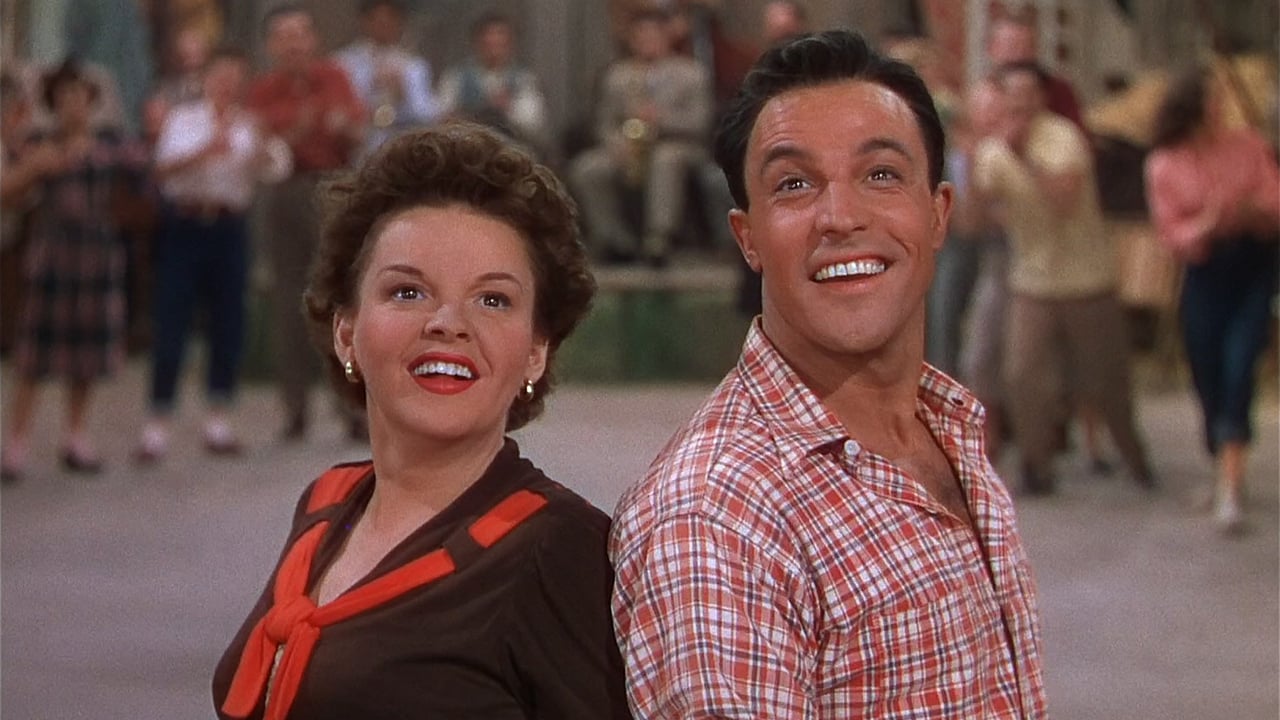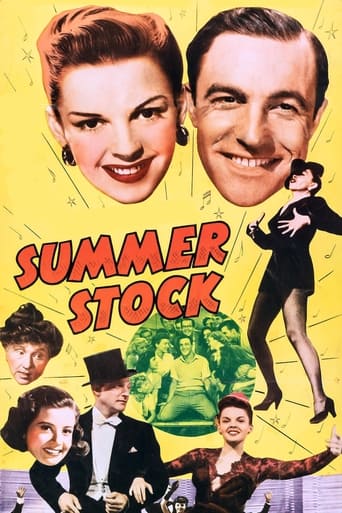

That was an excellent one.
... View MoreA bit overrated, but still an amazing film
... View MoreA film of deceptively outspoken contemporary relevance, this is cinema at its most alert, alarming and alive.
... View MoreThe movie turns out to be a little better than the average. Starting from a romantic formula often seen in the cinema, it ends in the most predictable (and somewhat bland) way.
... View MoreI just watched this movie again for the upteenthtime. (I have lost count.) I am always amazed at the talent of both stars, and that talent comes through in this movie beautifully. The musical numbers for both are wonderful to watch, reminding me that Judy could dance, something that isn't always remembered about her. As others have noted, the story is thin but who cares? This is pure entertainment and a chance to see two amazingly talented people work together in one film.By the way, I watched the movie on video tape (yes, my vcr still works) that I bought at the Judy Garland museum in Grand Rapids, Minnesota a few years ago. The museum is in her child hood home, and you can stand right on the landing at the bottom of the stars where she and her sisters performed at home. As a Judy fan, it was quite a thrill. So enjoy this movie for what it is - a showcase of two of Hollywood's greatest talents singing and dancing their way into our hearts.
... View MoreSadly, this is the last film before MGM fired Judy Garland. Its sad that her life was getting shaky around this time due to the toll her drug addiction was having on her. And I think it's even more sad that it was never Judy's fault that she got addicted to pills in the first place since it was MGM and Judy's mother that forced her to start and to keep taking these pills years earlier. They made her take these addictive stimulants so she could keep working long energetic hours at the studio. Then she became addicted to barbiturates cause the stimulants gave her insomnia. She and the other MGM stars were given some barbiturate pills half hour before bed, then fell asleep, then got woken up only 4 hours later and given their first stimulants of the day, a little breakfast (they were never allowed to eat that much so to keep their weight down), then back to work. Judy worked such long hours, slept those short 4 hour nights, and ate such a low calorie diet for so many years, that it all had taken such a toll on her by this time period, around 1950. And she wasn't as up to scratch at work anymore and was missing work all the time. That's why MGM fired her. Its all so unfair. Judy Garland was one of the most wonderful gifts we ever had in this world.Anyway, this film was pretty good but it wasn't one of the best like many of Judy's earlier films, but it was not Judy's fault. Some of the script is rather corny with the whole "goofy actors barging unannounced into Judy's barn" deal. I didn't care that much for the Phil Silvers character since he was too goofy and sorta a "bull in a China shop" kinda character. He destroys Judy's tractor, but not to be destructive, it's because he's clumsy and not smart enough to stay off a machine that he didn't know how to operate. Gene Kelly was good here but not quite as good as he was in "Me and my gal", "Anchors aweigh", and "Singin in the rain". And he and Judy, even though they are good together, did not have as much wonderful chemistry and magic together that they had in "Me and my gal". He still had a very good dance number where he kept ripping newspaper on the floor into smaller pieces with his dance moves. Judy still had some wonderful shining moments, especially when she sang including a very good song " Howdy neighbor, happy harvest" while she was riding home on her tractor. And also great in her famous "Get happy" song. Judy was engaged to Eddie Bracken, who was also sort of a goofy character, who was always irritating his dad. I liked Gloria Dehalivand as Judy's acting school sister who was the one who had the idea to stage production in her and Judy's barn to begin with. I didn't care for Judy's short hairstyle in this film as much as all her hairstyles in her previous films, but I still love Judy Garland very much. She was really one of the greatest things in Hollywood's already golden golden age.
... View MoreI agree she looked thicker but goodness that determines a good movie or not? Hence, why she had many issues. They harassed actresses then about being skinny made folks crazy. I like the movie. Great singing and dancing. Did the plot have to be supreme? I had fun. She was a very...no extremely talented woman. I will watch anything she ever did in show business. Actresses are nit multi talented like that anymore. Very one dimensional. They are just skinny...big deal. Give me talent anytime. I would watch it again. Love Judy Garland. Besides doesn't help in real life come from unexpected places just like the movie. The farm got help from actors. Hey what a good idea!
... View MoreJudy and Mickey were always trying to put a show on in a barn, and basically this musical with Gene Kelly is the same thing. Guess what? It's just as good.Ironcially, after this beautiful picture, Judy Garland parted company with MGM. In retrospect, it may have been a great thing that happened to her. She first would go on to win Oscar nominations for "A Star is Born," 3 years later and 7 years after that, turn a sensational performance in the supporting role of Irene Hoffman, in the memorable "Judgment At Nuremberg." To say that she was robbed of 2 Oscars for her efforts is to put it mildly.Judy is in top form as a singer and dancer and Kelly, as always, made dancing look so easy.Eddie Bracken is reduced to being the guy who can never land the girl, or if he does, there are complications. The former case is true with him in this film. Phil Silvers and Marjorie Main are along for the ride with their usual zany comedy talents.I just love Garland singing "Get Happy." While I still prefer Jane Froman doing that song, Garland brings life to it.
... View More